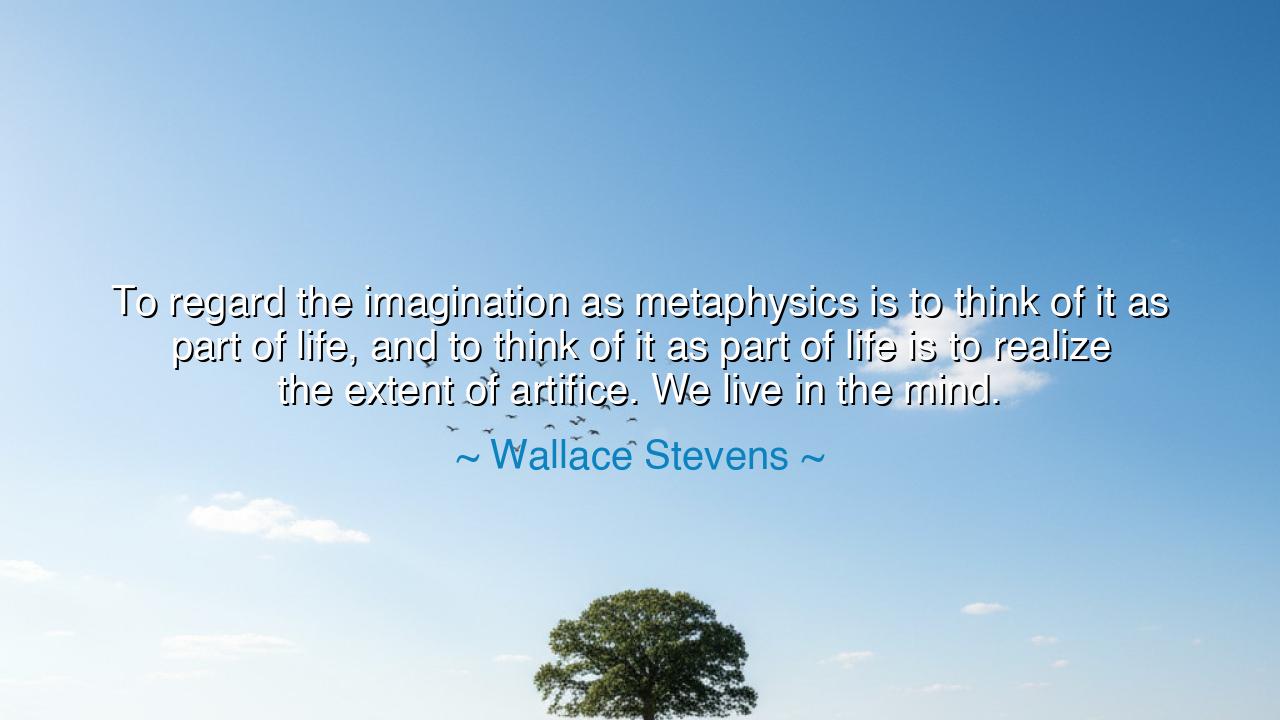
To regard the imagination as metaphysics is to think of it as
To regard the imagination as metaphysics is to think of it as part of life, and to think of it as part of life is to realize the extent of artifice. We live in the mind.






When Wallace Stevens wrote, “To regard the imagination as metaphysics is to think of it as part of life, and to think of it as part of life is to realize the extent of artifice. We live in the mind,” he was not speaking in riddles, but in revelation. His words unveil a truth both simple and vast: that imagination is not an escape from life—it is life. It is the lens through which we see, the flame that gives form to our thoughts, and the silent architect of reality itself. For to live is not merely to breathe or move, but to perceive, to dream, to make meaning. And all meaning is born in the mind—in that invisible realm where the material and the mystical become one.
The origin of this thought lies in Stevens’s lifelong quest to reconcile art and reality. As a poet and philosopher of the imagination, he stood between the worlds of business and beauty, logic and longing. In an age when science sought to strip life of mystery, Stevens declared that imagination was not fantasy but metaphysics—the soul’s way of understanding existence. To him, imagination was the creative principle by which human beings give shape to chaos. It is the divine faculty within us that builds meaning from the formless. Thus, when Stevens says “we live in the mind,” he reminds us that the outer world is but a reflection of the inner one; what we see depends upon what we imagine.
To regard imagination as metaphysics is to see it not as play, but as power. The ancients called it the nous, the mind that partakes in the divine. It is the realm where ideas precede creation, where possibility becomes being. When a sculptor imagines the figure within the stone, or a lover envisions the face of the beloved in a crowd, it is the imagination that reveals what the eyes cannot yet see. Stevens suggests that to imagine is to participate in creation itself—to become, for a moment, like the gods, shaping reality through thought.
Yet in the next breath, he speaks of artifice, of the constructed nature of all we call “real.” For if we live by imagination, then all our certainties are but beautifully woven fictions. Civilization itself is an act of artifice—the result of countless dreams given form. The city, the law, the faith, the art—these are the crystallized products of human imagination. To live consciously, then, is to recognize that life is a creation, not a given. It is to walk the world with reverence, knowing that every truth was once a thought, and every structure, once a dream.
Consider the story of Nicolaus Copernicus, who looked at the heavens and imagined a world turned inside out. The earth, he said, is not the center but the wanderer, circling a greater fire. His vision shattered the beliefs of centuries, yet it was born not of sight, but of imagination—a metaphysical insight into the harmony of the cosmos. The universe we know today, vast and elegant, began as a thought in the mind of one who dared to live within his imagination. In this, we see Stevens’s truth made manifest: that to imagine is to unveil reality itself.
But Stevens’s wisdom is not only for the scholar or the artist—it is for all who live. When he says “we live in the mind,” he means that our experiences, our joys and sorrows, our loves and fears, are not determined by the outer world, but by the inner one. A man may dwell in a palace and live in misery, or wander the wilderness and live in peace; it is not his surroundings but his imagination that shapes his life. To live nobly, therefore, is to cultivate the mind—to feed it with beauty, with curiosity, with vision. For the mind is both temple and battlefield, and imagination is the spirit that guides it toward creation instead of despair.
The lesson, then, is this: honor your imagination as the most sacred force within you. Do not dismiss it as idle fancy, nor let the dullness of routine suffocate its flame. Read deeply, dream boldly, and look upon the world as something always being made anew through thought. When you imagine, you are not escaping life—you are enriching it, renewing its mystery, and participating in its divine unfolding.
For as Wallace Stevens teaches, we are not creatures of flesh alone but beings of mind and vision. The universe is not something we stand outside of—it is something we co-create through perception and imagination. To live wisely is to live poetically—to recognize that every moment, every perception, every idea is an act of creation. So let your imagination be your compass, your mind your sanctuary, and your artifice—the life you build through them—your offering to the world. For indeed, we do not merely live in the world; we live in the mind, and in that boundless realm, we are all artists of existence.






AAdministratorAdministrator
Welcome, honored guests. Please leave a comment, we will respond soon